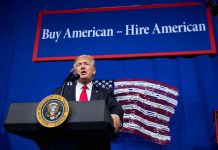By Eric Pfeiffer
Yahoo! News
Gary Johnson is the first Libertarian to get more than 1 million votes. (GaryJohnson2012)He may have received only about 1 percent of the national vote, but Gary Johnson is already the most successful White House candidate in the Libertarian Party’s nearly 41-year history.
“Ours is a mission accomplished,” Johnson told FoxNews.com. “We put a true small-government, individual-freedom option on the ballot in virtually every state and have assembled an organization that will carry that message forward.”
With final vote tallies still being calculated, Johnson’s current total of 1,139,562 puts him significantly ahead of any of his party’s nine other presidential candidates.
Interestingly, the only other Libertarian Party candidate to receive more than 1 million votes was Georgia Public Service Commission candidate John Monds, who received 1,076,726 votes, or 33.4 percent of the vote, during his 2008 campaign.
The most successful third-party candidate runs have historically been done by independents, most famously by Ross Perot in 1992 (19,743,821 votes, 18.91 percent) and John Anderson in 1980 (5,719,850 votes, 6.61 percent).
1980 was also a good year for Libertarian candidate Ed Clark, whose 921,128 votes and 1.06 percent share of the total vote was the most successful performance by a presidential candidate in his party until Tuesday night.
Still, the Libertarians’ first-ever presidential candidate, John G. Hospers, is their most successful candidate by a different measurement. Though he received only 3,674 total votes, he’s still the only Libertarian Party presidential candidate to win an Electoral College vote.
Most candidates from the Libertarian Party, which was founded in December 1971, have typically garnered about 500,000 votes in their respective runs.
Johnson said he’s buoyed by the results and plans to maintain his role as an advocate for limited government policies. However, when asked, he was unwilling to say whether his historic performance was enough to guarantee another run in 2016.
“It’s too soon to be talking about 2016,” he said.










Gary Johnson just about QUADRUPLED his nationwide popular vote tally, but proved that the current system is pretty much about maintaining the current duopoly. He still got ZERO electoral votes, which is what COUNTS. Folks whom criticize the Electoral College often forget that it was a HUGE compromise on the part of the so-called (at the time), “Small” (in population) states, in that the proportion of electors was overwhelmingly allocated to the “large” states, by dint of the formula one per House seat and one per Senate seat. It would have been better to have adopted the method that Nebraska and Maine use, at least, the POTUS race is effectively by Congressional District, with the plural winner getting the two EC votes that come via the Senate, so the local aspect is more of a factor. Of course, since Article Two gives the power of electing the President to the STATES, and NOT the people at large, there is, and has never been, ANY Federal law requiring a popular election for POTUS at all! There is since 1913 the 17th Amendment for Senators; but not the current infestor of 1600 Pennsylvania Ave, Washington DC 20031. There have been FOUR Amendments regarding the Presidency (Nos. 12, 20, 22, and 25), but NONE have mandated popular elections in the several states.
Remember, the Democratic and Republican parties were once 3rd parties. Granted, they’ve stacked the deck, but they can’t control the entire game.
Nice to hear about the libertarian success, but it is still less than 1% of the total vote.
It speaks volumes about the number of people that want more government provided it promises to do what they want.
I had an opportunity to speak to a 5th grade class about the election. They were surprised that there were more than 2 parties running for president. (The school was running a mock election with only 2 choices.)
I showed them a sample ballot from Hunterdon county NJ.
Their questions were encouraging to me. They wondered why only 2 parties were in the debates. They asked about the “NSA did 911” party. They wondered why people do not hear about the other parties.
Hopefully their sense of fairness will not go away. Hopefully they will settle with 2 choices in the future.
That should read:
Hopefully they will not settle with 2 choices in the future.